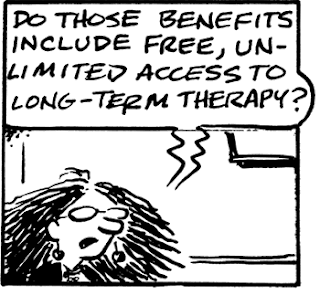I previously posted about considering the relative merits of job offers (if you have more than one). Here are a few random thoughts about negotiating.
First, until you have an offer in writing you do not have an offer. A verbal offer or a promise or a hint of "an almost certain" offer is not an offer. Things can go wrong. Deans can veto decisions of departments. A budget crisis emerges suddenly. Someone in the decision chain dies. The US government defaults on its loans.....
Second, once you have the written offer the dynamics and "power balance" of the relationship between the employer and the potential employee completely change. Before you had to tread lightly and be careful not to offend. Now you can ask for anything. I am not suggesting that you do (see the next point). They can always say no. However, it is quite reasonable to ask them to fly you (and possibly even your family) for a second (or first) look. This is when you really need to find out the "dirt" on who you may be working with or for. Honest and open discussions about expectations and resources are crucial. It is particularly important that you talk to some recent hires for similar positions as yours. For example, if you are being hired as an assistant professor I would try and talk in person to others in the department. Are they happy? Do they have any advice for you? If you are being hired as a postdoc in a specific group then talk to current or recent postdocs from the same group. These conversations can save you a lot of pain and frustration or give an sense of assurance about what you can expect. Experimentalists need to be be certain that the equipment that they need is available (and functioning) or is certain to become available (e.g. through adequate start-up funding) in a timely manner.
Third, be careful that your requests and negotiating points are reasonable. Making unreasonable requests/demands may have a negative effect on your relationship with your future boss and colleagues. Focussing a lot on minor salary details will communicate something about your priorities. Bear in mind that sometimes details of these "confidential" negotiations become more widely known and may affect your reputation in the broader community. [e.g., the Assistant Professor who requested a separate coffee room attached to his lab.]. What is reasonable? That really depends on how much they want you, how many resources are available, and what is "normal". Running possible requests by a more experience colleague before you make them is a good idea.
Fourth, get everything promised in writing. If you don't it is quite likely you won't get what you are promised. Even if you do have it in writing that will not necessarily guarantee it.
Cartoon by Kerry Soper is from here.
Subscribe to:
Post Comments (Atom)
A golden age for precision observational cosmology
Yin-Zhe Ma gave a nice physics colloquium at UQ last week, A Golden Age for Cosmology I learnt a lot. Too often, colloquia are too speciali...

-
This week Nobel Prizes will be announced. I have not done predictions since 2020 . This is a fun exercise. It is also good to reflect on w...
-
Is it something to do with breakdown of the Born-Oppenheimer approximation? In molecular spectroscopy you occasionally hear this term thro...
-
Nitrogen fluoride (NF) seems like a very simple molecule and you would think it would very well understood, particularly as it is small enou...




No comments:
Post a Comment